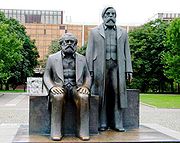
The Holy Family (book)
Encyclopedia

Karl Marx
Karl Heinrich Marx was a German philosopher, economist, sociologist, historian, journalist, and revolutionary socialist. His ideas played a significant role in the development of social science and the socialist political movement...
& Friedrich Engels
Friedrich Engels
Friedrich Engels was a German industrialist, social scientist, author, political theorist, philosopher, and father of Marxist theory, alongside Karl Marx. In 1845 he published The Condition of the Working Class in England, based on personal observations and research...
in November 1844. The book is a critique on the Young Hegelians
Young Hegelians
The Young Hegelians, or Left Hegelians, were a group of Prussian intellectuals who in the decade or so after the death of Hegel in 1831, wrote and responded to his ambiguous legacy...
and their trend of thought which was very popular in academic circles at the time. The title was a suggestion by the publisher and is meant as a sarcastic reference to the Bauer Brothers and their supporters. The book created a controversy with much of the press and caused Bruno Bauer
Bruno Bauer
Bruno Bauer was a German philosopher and historian. As a student of GWF Hegel, Bauer was a radical Rationalist in philosophy, politics and Biblical criticism...
to attempt to refute the book in an article which was published in Wigand's Vierteljahrsschrift in 1845. Bauer claimed that Marx and Engels misunderstood what he was trying to say. Marx later replied to his response with his own article that was published in the journal Gesellschaftsspiegel in January 1846. Marx also discussed the argument in chapter 2 of The German Ideology
The German Ideology
The German Ideology is a book written by Karl Marx and Friedrich Engels around April or early May 1846. Marx and Engels did not find a publisher. However, the work was later retrieved and published for the first time in 1932 by David Riazanov through the Marx-Engels Institute in Moscow...
.
History

After conversing, they began drawing up plans for a book about the Young Hegelian trend of thought very popular in academic circles. Agreeing to co-author the Foreword, they divided up the other sections. Engels finished his assigned chapters before leaving Paris. Marx had the larger share of work, and he completed it by the end of November 1844. (Marx would draw from his Economic and Philosophical Manuscripts
Economic and Philosophical Manuscripts of 1844
Economic & Philosophical Manuscripts of 1844 are a series of notes written between April and August 1844 by Karl Marx. Not published by Marx during his lifetime, they were first released in 1927 by researchers in the Soviet Union.The notebooks are an early expression of Marx's analysis of...
, on which he'd been working the spring and summer of 1844.)
The foremost title line — "The Holy Family" — was added at the suggestion of the book publisher Lowenthal. Its a sarcastic reference to the Bauer brothers (Bruno and Edgar) and their supporters amongst the Hegelians who had attempted a critical renovation of Christianity, hence the subtitle a "Critique of Critical Critique." Later Marx will continue this sarcasm by referring to them as Saint Bruno, Saint Max (Stirner
Stirner
Stirner:* Max Stirner, pseudonym for Johann Caspar Schmidt , German philosopher and journalist* Karl Stirner , painter, illustrator and poet...
), etc.
The book made something of a splash in the newspapers. One paper noted, that it expressed socialist views since it criticised the "inadequacy of any half-measures directed at eliminating the social ailments of our time." The conservative press immediately recognized the radical elements inherent in its many arguments. One paper wrote that, in The Holy Family, "every line preaches revolt... against the state, the church, the family, legality, religion and property." It also noted that "prominence is given to the most radical and the most open communism, and this is all the more dangerous as Mr. Marx cannot be denied either extremely broad knowledge or the ability to make use of the polemical arsenal of Hegel's logic, what is customarily called 'iron logic.'"

